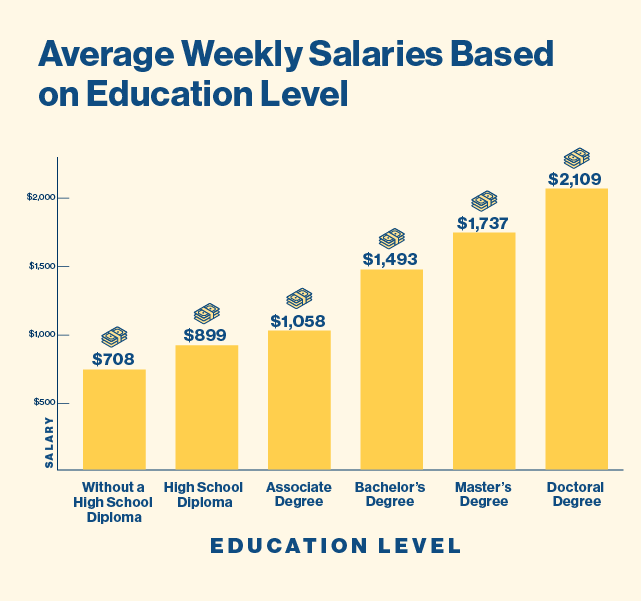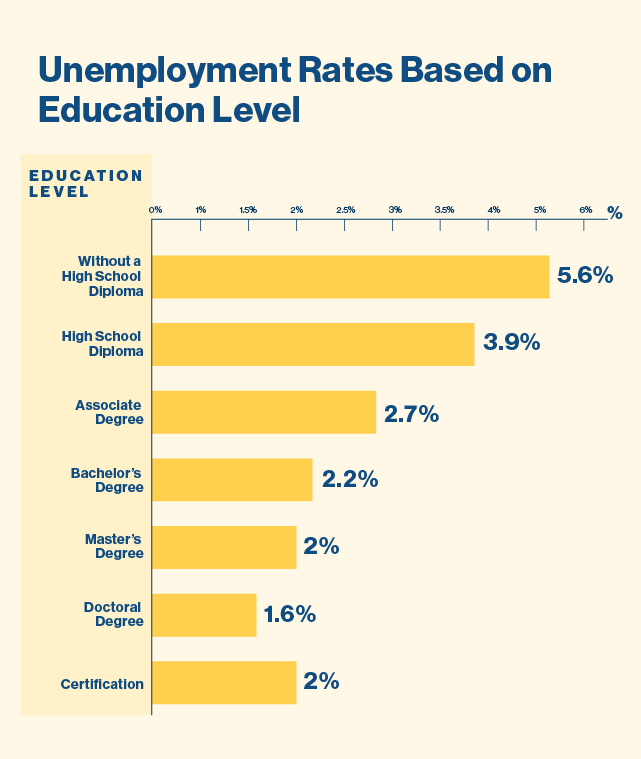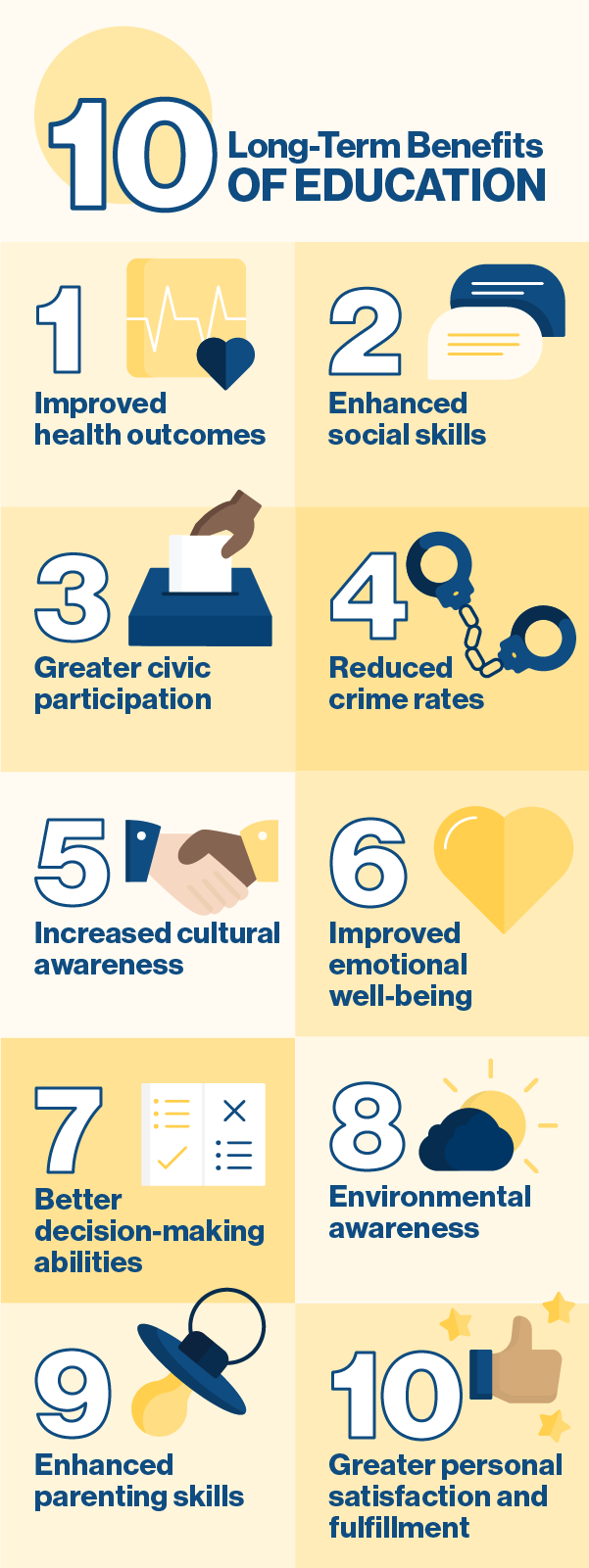
Does Education Make a Difference in Salary? (How Learning More May Help You Earn More)
Jun 20, 2024
9 min read
Education at any level can offer a variety of benefits. Getting a high school diploma, earning an associate degree or bachelor’s degree, or earning career training or certifications are more than just milestones; they can have long-term, positive impacts on your life and career. In fact, the more education you have, the higher your salary can be!
Does education make a difference in salary?
Several jobs, at minimum, require at least a high school diploma to even get your foot in the door, with 37% of projected job openings to be at the high school diploma level from 2019-2029. The more credentials you have from there, the more likely it is your salary will increase. College degrees or certifications can amp up your resume and your salary.

Average salary with a high school diploma
Those in the workforce without at least a high school diploma can expect to make an average of about $708 on a weekly basis. Those with a high school diploma make an average of $899 on a weekly basis. With inflation and the cost of living so high at the moment, a salary bump of almost $200 can only benefit you.
Penn Foster High School graduate Kimberly Quinonez knows first-hand how much of an impact having your diploma can have on your life. Before earning her diploma, she was only able to volunteer at her current place of full-time employment. Obtaining this credential allowed her to officially get on the books as an employee at a local sheriff's department.
Read more: How to Stay Motivated and Graduate High School Online
Average salary with a college degree
A college degree can open opportunities and potentially increase your salary.
On average, here is your weekly salary with:
- An associate degree: $1,058
- A bachelor’s degree: $1,493
- A master’s degree: $1,737
- A doctoral degree: $2,109
Read more: What Jobs Can You Get With an Associate Degree?
Salary changes with a course or certification
Specific certification can help increase your salary between 5 and 20%, depending on the field and demand. Steve Strapple, Skilled Trades Academic Lead at Penn Foster Group, says, “Education is going to open doors to bigger opportunities. Every certification means more money in their pocket because they are more qualified."
When considering real world benefits to taking a certification course, Penn Foster Small Engine Repair graduate David Pennington has this to say: "Just being away from [a] job for so long and now going back into it and being in charge of that job now, I have even more detail to share with my guys at work to show, 'Hey this is why that does that.'"
Read more: How Penn Foster is Expanding Skilled Trades Programs
Does education make a difference in unemployment?
The unemployment rate is highest for those without a high school diploma, coming in at 5.6% on average. When discussing hiring practices and resumes, Kristen Schenck, Talent Acquisition Associate at Penn Foster Group, says “what I'm looking for and most of the managers are looking for is, do you have the credentials? Do you have that degree? What have you learned? Not only that, but it shows that you have motivation to further your education to grow as a person. It shows a sense of motivation and determination and hiring managers are getting a sense of your obligation and commitment to doing hard things, overcoming things, doing things that are outside your comfort zone. That all comes with someone seeing that you have a credential or a degree of some kind.”

Average unemployment with a high school diploma
The unemployment rate decreases with each tier of education. The rate of unemployment with a high school diploma decreases to 3.9% on average from 5.6% amongst those without a diploma.
Read more: How A High School Diploma Can Help Your Career
Average unemployment with a college degree
The rate of unemployment continues to shrink with each college degree obtained:
Associate degree: 2.7%
Bachelor’s degree: 2.2%
Master’s degree: 2%
Doctoral degree: 1.6%
Penn Foster Veterinary Technician graduate Lynn Blake highlights the importance getting a degree can have on your career. “I was an on-the-job trained person and there's no disrespect to that, it is very important. But if you want to advance your understanding, know your why, and really make this your career, getting the degree is the first step to that."
Read more: Do I Need to Go to College to Get a Good Job?
Average unemployment with a course or certification
While you still usually need a high school diploma before you can sit for a certification exam, once you obtain certification your salary may be higher than without certification. Different states have different requirements when it comes to certification, but some require you to be certified to do certain jobs. The unemployment rate for those with certifications or licenses is only 2%.
A Penn Foster learner survey of skilled trades students found that 66% of students are currently employed full-time.* This demonstrates the benefits of career programs and seeking certifications.
Read more: 5 Secrets To Make Your Resume Stand Out
Resources for helping you get more education
The good news is that continuing education doesn’t have to be hard to do! Whether you’re looking to get your diploma, degree, or want to get a certification or additional courses under your belt but aren’t sure where to start, Penn Foster has plenty of resources for you!
Here are some blogs you can check out for information on obtaining more education!
High school resources:
How to Decide if a Diploma or a GED is Right for You
What Is Virtual High School, And Is It Right for Me?
Your Guide to Credit Recovery for High School
College resources:
What’s the Difference Between Associate and Bachelor’s Degrees?
8 Online Degrees That Pay Well & You Can Start Today
CVT vs LVT vs RVT: What’s the Difference?
Certificate program resources:
Jobs in Healthcare Management & Healthcare Administration: Your Career Guide
Your Step-by-Step Guide to Becoming a Pharmacy Technician
Long-term benefits of education

There are many benefits beyond salary to obtaining more education. Believe it or not, acquiring more education can have positive impacts on your health. It can also reduce crime rates and increase cultural awareness.
In your personal life, getting more education under your belt can help improve your emotional well-being and contribute to your ability to make decisions. Penn Foster High School graduate Sydney Zaremba Woodward found herself developing critical thinking skills as she worked through the program. "It benefited me in such a way that I had to have critical thinking skills with coursework, how I was writing papers, but it also transferred into the real world- going around and using it on a day-to-day basis, which I never had to before when I was in a regular school."
Read more: Beyond Graduation: How High School Prepares You for Success
Get the education you want on your time
It’s hard to dispute how many benefits there are to reaching educational milestones and continuing to further your education. Not everyone is able to go to school full-time, however. Penn Foster Group’s Chief Learning Officer Andy Shean, PhD, shares that “today, people really recognize online degrees as comparable to a traditional campus-based program,” making this a viable option for anyone in need of more education as well as flexibility.
Penn Foster programs range from high school to degree to career, and the best part is they’re all online and self-paced! Start stacking your credentials and enroll today by calling 1-800-275-4410.
*Data sourced from a 2024 Satisfaction Survey conducted by Penn Foster Group.



